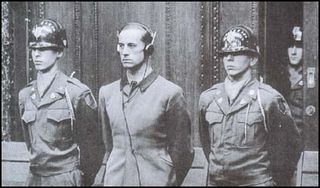 August of this year will mark the 65th anniversary of the conclusion of the historic Doctors’ Trial at Nuremberg, Germany, which brought to the bar of justice many leading figures in the Nazi medical establishment. These were doctors who committed major atrocities in the name of medicine and in the name of science, and in the process inflicted horrific pain, suffering, and death on their victims.
August of this year will mark the 65th anniversary of the conclusion of the historic Doctors’ Trial at Nuremberg, Germany, which brought to the bar of justice many leading figures in the Nazi medical establishment. These were doctors who committed major atrocities in the name of medicine and in the name of science, and in the process inflicted horrific pain, suffering, and death on their victims.
The Spring 2012 issue of Penn Medicine includes a look back at the trial by Harry Reicher, LLM, an adjunct professor at the University of Pennsylvania Law School. Reicher, a specialist in global human rights and international law, has served on the United States Holocaust Memorial Council and has given lectures on the Doctors’ Trial. He has also been involved with the Fellowship in Auschwitz for the Study of Professional Ethics (FASPE) program. He speaks to professional students who have been named FASPE Fellows at Manhattan’s Museum of Jewish Heritage – A Living Memorial to the Holocaust, part of their preparation before they leave for Poland. The article in Penn Medicine includes heartfelt essays by two Penn medical students who earned their medical degrees in May and who were FASPE Fellows. One of the reasons Reicher got in touch with Penn Medicine was his experience that the history of Nazi medicine – its particular form of perversion – was not well known among students and particularly medical students.
The context for Reicher’s article was broadened by the
revelations last year that United States physicians had organized and led an ethically horrendous medical experiment in Guatemala from 1946 to 1953. In other words, just as the trial of the Nazi doctors was finishing, our own physicians were proceeding as if the trial – and the scrutiny of modern medicine it provoked – had never happened. In September,
The Presidential Commission for the Study of Bioethical Issues, headed by
Amy Gutmann, PhD, president of the University of Pennsylvania, determined that researchers in the United States Public Health Service intentionally left more than 1,300 Guatemalan prison inmates, psychiatric patients, commercial sex workers, and soldiers exposed to sexually transmitted diseases. Guatemalan officials also took part in the study, designed to test the effectiveness of antibiotic penicillin. Writing in
The Huffington Post, Gutmann noted that the experiments, done completely without obtaining consents, “resulted in a living hell for many of their subjects.”
In his Penn Medicine article, Reicher provides the more general background to the Doctors’ Trial in Nuremberg, then focuses on three of the Nazi doctors in particular. The lead defendant was Dr. Karl Brandt, who was, among other things, Adolf Hitler’s personal physician. He also was personally and centrally involved in the first official act of state-sanctioned euthanasia under the Nazi regime. There were many to follow.
Dr. Sigmund Rascher, another defendant, conducted high-altitude experiments at Dachau concentration camp, simulating the loss of pressure that a Luftwaffe pilot would experience while flying at 68,000 feet. Prisoners were forced to take part in these excruciating experiments. The third Nazi doctor that Reicher discusses was Dr. Carl Clauberg, a gynecologist. He was allowed to take charge of Block 10 of Auschwitz, where he practiced his experiments, sterilizing women. Part of the experiments included injecting acids into their reproductive organs, without anesthetics.
In his sidebar essay, Elliot Rabinowitz, MD, a 2012 graduate of the Perelman School of Medicine, noted that his experience with the Fellowship in Auschwitz for the Study of Professional Ethics “will live with me for the rest of my life.” Among the questions the FASPE program forced him to ask himself: “How can I be sure that I, as a future physician, do what is right by my patients?” For Noemi Spinazzi, MD, also a 2012 graduate of the Perelman School of Medicine, the FASPE experience, including her walk in the rain through Auschwitz I and II, forced her to confront the meaning of the Nazi phrase “life unworthy of life.” How, she asked herself, could anyone find life worth fighting for in such horrible circumstances – but she sees “a small ray of hope” in the impact survivors of such camps and their progeny have had on the world.
Not a physician himself, Reicher points out that comparable trials took place at Nuremberg for other professionals, including lawyers and industrial leaders. About medicine: “It can be the noblest profession, practiced at the highest level of altruism. But if it falls into evil hands, it can become an instrument of so much brutality, so much evil, so much inhumanity.”
The good news is that, last fall, the federal commission that examined the U.S. study in Guatemala concluded that such experiments “could not be approved under the current system for protecting human subjects in U.S.-funded research. Our younger generations of doctors should know examples of medicine at its best – but knowing the history of medicine at its worst, whether in Nazi Germany or in a United States experimental study in Guatemala, can have a beneficial and cautionary effect as well.
Caption: Dr. Karl Brandt at his sentencing.